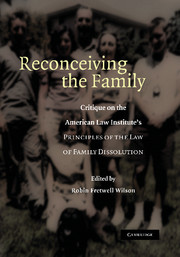 Reconceiving the Family
Reconceiving the Family Book contents
- Frontmatter
- Contents
- Acknowledgments
- Foreword, by Mary Ann Glendon
- List of Contributors
- Introduction
- PART ONE FAULT
- PART TWO CUSTODY
- PART THREE CHILD SUPPORT
- PART FOUR PROPERTY DIVISION
- PART FIVE SPOUSAL SUPPORT
- 11 Back to the Future: The Perils and Promise of a Backward-Looking Jurisprudence
- 12 Money as Emotion in the Distribution of Wealth at Divorce
- 13 Postmodern Marriage as Seen through the Lens of the ALI's “Compensatory Payments”
- PART SIX DOMESTIC PARTNERSHIP
- PART SEVEN AGREEMENTS
- PART EIGHT JUDICIAL AND LEGISLATIVE PERSPECTIVES
- PART NINE INTERNATIONAL REFLECTIONS
- Afterword: Elite Principles: The ALI Proposals and the Politics of Law Reform, by Carl E. Schneider
- Index
12 - Money as Emotion in the Distribution of Wealth at Divorce
Published online by Cambridge University Press: 25 January 2010
- Frontmatter
- Contents
- Acknowledgments
- Foreword, by Mary Ann Glendon
- List of Contributors
- Introduction
- PART ONE FAULT
- PART TWO CUSTODY
- PART THREE CHILD SUPPORT
- PART FOUR PROPERTY DIVISION
- PART FIVE SPOUSAL SUPPORT
- 11 Back to the Future: The Perils and Promise of a Backward-Looking Jurisprudence
- 12 Money as Emotion in the Distribution of Wealth at Divorce
- 13 Postmodern Marriage as Seen through the Lens of the ALI's “Compensatory Payments”
- PART SIX DOMESTIC PARTNERSHIP
- PART SEVEN AGREEMENTS
- PART EIGHT JUDICIAL AND LEGISLATIVE PERSPECTIVES
- PART NINE INTERNATIONAL REFLECTIONS
- Afterword: Elite Principles: The ALI Proposals and the Politics of Law Reform, by Carl E. Schneider
- Index
Summary
The ALI's Principles take an incoherent body of law governing the treatment of nonfinancial contributions to wealth accumulated during marriage, a body of law with many unresolved tensions, and treat it as might be expected. To the ALI's credit, the Principles' treatment of nonfinancial matters, although it too is incoherent, is more thoughtful than the underlying law it seeks to organize and describe. Nonetheless, this chapter examines one deeply flawed choice animating the Principles, the attempt to separate financial and nonfinancial matters.
The Principles attempt to separate emotional and personal aspects of a marriage from financial ones in numerous places. The drafters' approach is to acknowledge and settle financial issues between the parties, but to leave nonfinancial disputes without legal remedy. The drafters aim to avoid dealing with the more emotional issues surrounding marital dissolution by removing nonfinancial matters from consideration. This approach is problematic for several reasons. First, most marriages include countless negotiations and bargains weighing financial matters against nonfinancial matters. Remedies that fail to capture those bargains are likely to be unfair. Second, this approach fails to appreciate how emotional the financial issues can become within marriages and at the time of marital dissolution. Finances are not distinct from emotions in relationships, but are an avenue through which spouses express emotions. Finally, even if it were well advised, the drafters' attempt to sever nonfinancial matters from divorce proceedings is futile.
- Type
- Chapter
- Information
- Reconceiving the FamilyCritique on the American Law Institute's Principles of the Law of Family Dissolution, pp. 234 - 248Publisher: Cambridge University PressPrint publication year: 2006
